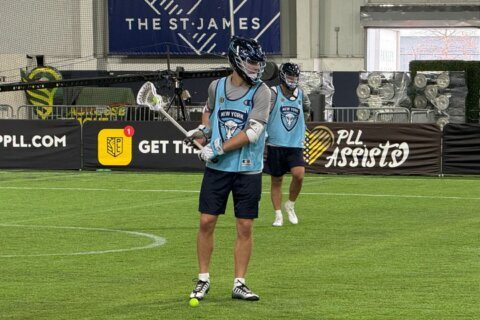WASHINGTON — Quick — name the last Division I college baseball game played in D.C.
It’s been longer than you probably realize. Georgetown plays its games in Bethesda and George Washington plays across the river in Arlington. American only has club baseball. Howard shuttered its program in 2002.
This weekend, Division I baseball will be played in D.C. for the first time since 2012, when GW played Cornell at Catholic University. Harvard, Lafayette and Coppin State will play a round robin of six games at the Washington Nationals Youth Baseball Academy. Dubbed the Headfirst Honor Roll Camps Collegiate Challenge, it’s free to the public. The organizers hope it can be an opportunity for aspiring players and kids who would never have a chance to see high level baseball played in person to dream.
“What I offered to do for the Academy was to try to put something together based upon people that I knew either personally or through relationships I had formed through the Grays,” he said.
Using his personal and professional connections, he was able to bring together three programs that probably would never have a reason to play one another or to travel to D.C. It just took some time.
“Division I baseball teams generally schedule a couple years ahead,” Spera said. “The soonest we could get it on their schedules was two years out, in 2017. And here we are.”
Tal Alter, executive director of the Youth Baseball Academy, grew up playing baseball in the District and went on to play for Haverford College. He sees this weekend as an extension of the type of development the academy was created to instill.
“For our kids to see and meet the epitome of scholar-athletes in the form of college players from such well-regarded schools can absolutely contribute to this positive sense of self and future focus,” he said in a statement to WTOP.
Spera hopes that the high level of play and interactive experience will create a spark of interest for the game. There will be opportunities to get down on the field and interact with the collegiate student-athletes throughout the weekend.
“These are schools you’ve heard of — an Ivy League school, a Patriot League school, a local, Baltimore-based HBCU — out there on the field, high level of baseball,” Spera said. “Hopefully it gives the community, and particularly the young people in the community, something to relate to. This is something that could happen.”
Coppin State head coach Sherman Reed is thrilled at the opportunity to play in his own backyard. Growing up in West Baltimore, his love of the game was fostered by free community-organized field trips to Memorial Stadium, where kids were given a hot dog, a drink, a T-shirt and a ticket to the game. He recognizes that the same kind of outreach is needed today, and that this weekend is a first step in that direction.
“I hope that, given the logistics of where the (Youth Baseball Academy) is, once they see the lights on — we get kids that will come out of their homes,” he said.
Reed says he’s had this weekend circled on his calendar as an exciting opportunity for his players to get out and connect with the D.C. community. On the rare occasion that a top player comes out of the District, they often opt to go south for college, ignoring local options like his Coppin State program. That makes this a golden opportunity to show what his program has to offer.
“There’s this stigma about going north,” said Reed. “Even though we’re just a state north of the District and even with some of the great schools of the D.C. area.”
He hopes the event can become an annual tradition. But the challenge of attracting the next wave of athletes goes beyond just offering the product.
Baseball still lags well behind college “revenue sports” basketball and football, and doesn’t even receive the same level of scholarship funding as sports like lacrosse. On Reed’s team of 34, there are only 11.7 full scholarships to split between his players. When two-sport athletes are faced with the financial reality of a full ride in another sport against a partial or nothing at all to play baseball, the decision to go the other direction is entirely understandable.
“That’s been a problem that I think Scott Boras was the first to really be outspoken about,” says Reed, who thinks the solution needs to come from the professional level. “More should be done by MLB, because we act as a feeder for Major League Baseball. It’s going to be up to someone from Major League Baseball with deep pockets to step up and subsidize.”
Until then, weekends like this one will serve as a building block, bringing more young eyes to the game. Perhaps by the time they’re graduating from high school there will be a more comprehensive system in place to help them further their education and build their future through the game.







